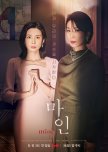
Within a male dominated spectacularly exclusive golden Jaebeol-Cage women stand up for their rights
The (fictional) Hyowon Group's extended family is among the richest one percent in the country. This clan is analyzed in detail with their personal stories and their dynamics among themselves. It quickly becomes clear that despite all the wealth, nobody is happy here. They are prisoners in a golden cage of their own greed. The peacock cage in the park of the estate is a beautiful allegory for this.If they were just satisfied with what is, they might be better off. But it always has to be more. "Mine... Mine... I want it... I want more... I don't want to give it away..." Communication is replaced by competition, love and comfort by money and luxury. The price has to be payed by suffering souls. Having lost their grounding in trust, sympathy and kindness, they somehow blindly fight for a substitute. "Mine" thus illustrates their sandbox games including mud fight. Maybe with designer sand - the architecture and furnishings are spectacularly exclusive down to the last detail. You don't have to like that, but it is supposed to impress - and it does.
Still, mud is just mud... And it is disgusting to deal with.
The Jaebeol orbit traditionally is a man´s world. In this respect the KDrama "Mine" choses a unique and inspiring approach: Here concentrated, intelligent and courageous women's power is fighting for liberation from the golden cage. This is possible in South Korea in 2021. Also that one of the female protagonists is in love with a woman. Can women set themselves free from male dominated power structures and constraints? There are some truly beautiful, touching, powerful moments of sisterhood and women's power. Sometimes offensive, sometimes subtle.
If you like, "Mine" is also a contemporary social criticism, quietly hidden behind the curtain of an exclusive and alien world of feudal arrogance. The orbit of the Jaebeol may be far far away from the rest of the world, but with all the interpersonal and inner-psychic dynamics (actually quite ordinary and human) that are in focus here, it comes very close to the themes of 'normal' (South Korean) society - with its social constraints, its strict hierarchical structures and their prejudices that put chains on people of almost every social class. The audience is thus free to choose who from the Hyowon clan household they want to identify with. And whether they want to dare to break free, too, and take a different path (together with one or the other protagonist).
--------------------- SIDE NOTE: --- Jaebeol and their different topics among second and third generation heirs ---
The rise of the founding Jaebeol, like the growth of their companies, was shaped by strong patriarchal hands. Hardworking hands, too. However, this first generation patriarchs are slowly dying out... this being accompanied by creeping processes of change. The founding fathers knew where they came from. Plus, from the very first hour, they had long-standing, loyal relationships with their assistants, secretaries, drivers, foremen that had grown over time (even if they were characterized by dependency)... and over time they have built up a systematic network that takes care of their interests wherever they wish.
Their offspring however is already born "with the golden spoon in their mouth", spoiled by wealth and far away from the ordinary people who work for them and their living environment. These Jaebeol are increasingly preoccupied with their ego, family dynamics, scandals and inheritance disputes. They lack ´brothers in arms´, who shed their blood, sweat and tears - thus they lack someone they can trust. The principle of bribery may still work, yet the reins are now in several, increasingly fractious hands. By now many Jaebeol-Clans have already begun to dismantle their power structures by themselves. And if not, their past machinations are increasingly catching up.
"Mine" documents quite vividly how the Jaebeol families dismantle themselves... how the heirs identify with their (still young!) identity as Jaebeol as if they were feudal old noble blue blood... They haven't really had to prove themselves yet and by their arrogance are already failing in the second and third generation. Additionally, the youngest generation increasingly is no longer interested in the corporate empire, let alone their management...
In this respect "Mine" also represents a new variety of topics within the Jaebeol-Genre in KDramas for the 2020s. ´Competition´, ´cabal´ and ´revenge´ as leading subjects have already been processed back and forth since the early hour of KDrama. ´Justice´ was an increasing topic during the last decade. ´Breaking free´ as a Jaebeol-topic however so far is rather new and rare, yet it might increase in the future...
-------------------------------------------

A refreshingly sassy KDrama, critically reckoning with the South Korean education system (and love)
“The Midnight Romance in Hagwon” promises a love story with its international title - and that's what we get. Jung Ryeo-won and Wi Ha-joon are creating the relatively adult, authentic aura of a tender but complicated love relationship between a former graduate and his former tutor. Yet, the two are more than a couple. Today, as teachers, they inspire each other to teach didactically creative. And in doing so, they also inspire their students.Thus, the KDrama, which in the original means something like “The Graduate”, basically offers more than a romance. It is rather a quite critical reckoning with the South Korean education system. The criticism: It's less about education than about grades -and a lot of money is involved in getting good grades. The students learn the correct answers to their questions. They therefore receive any effective support outside of school, mainly in the tutoring academies, provided their parents can afford it. However, there is one thing, the students don't learn: how to ask the right questions. They don't learn to question or get to the bottom of something. They know their material they have to memorize and what formulas they should be able to apply. Everything else is not part of the entrance exam or a prerequisite for qualifying for admission to one of the three large SKY universities. It has to be Seoul National University, Korea University or Yonsei University (S, K and Y), if anyone in South Korea is to become something...
"The Midnight Romance in Hagwon" aka "The Graduate" takes stock of the prevailing, dubious, even misleading values of a society, still trying to convince the people that they have to obsessively achieve something in order to be valuable of some sort.
When it comes to the academy teaching staff, it is about tailor-made exam preparation, courting parents an acquiring new students. Looking to the right or left, seeing a student as an individual human being with dreams and needs, let alone respond to them? Oh my! Whether it's students or scandals, it's never about the people. It's always about the money. A lot of money. The competition is enormous. The South Korean education market is a lucrative economic engine that is humming along happily.
This KDrama offers a wonderfully staged, emotionally sensitive and vivid approach to these issues, using the fate of various ambitious, highly motivated teachers who would like to try something different, but are not allowed to. They are surrounded by elitist parents who are ready to do anything for the glorious future of their beloved, dearest offspring. They are also surrounded by fiercely competitive academies that are just waiting for someone to make a mistake, because then those protégés can easily be poached and their own coffers start ringing instead...
What a refreshingly sassy KDrama, dealing with all those issues...
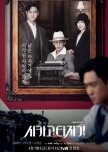
Touching. Exciting. Stylish. Passionate. Atmospherically dense, especially regarding the 1930s
For me, "Chicago Typewriter" needed a second attempt. The first time I didn't really know what to do with it. ...A smart spring chicken, but somehow paranoid writer, spoiled by success and money, and a cute girl as his fan? The story - fancy as it may come along - at first glance appeared a bit all too playfully shallow for my taste. I wasn't convinced. Although I actually really like actor Yoo Ah-in.Actually, I was mainly curious about the past (around 1930 when ´Korea´ was a colony of Japan). One of "Chicago Typewriter"'s two storylines is set in the context of the 1930's Gwangju student movement. With regard to the KDrama´s historical plot line though, it felt like nothing really happened for a long time. Accordingly, when I first had tried to watch "Chicago Typewriter", I didn't make it past the "beginning". However, somehow I kept stumbling across this KDrama and it wouldn't let go off me. Eventually I gave it another try. Lo and behold, with a little patience, the KDrama took me by the hand and developed an exciting story with a lot of passion and atmospheric density, especially when it came to the 1930s. The insight into that time had lasting impressions. Still, the relationship dynamics between the leads especially in the present time story line sometimes were little too light-weight, harmless and on the verge of silliness for my taste. However this was perfectly balanced in the context of their mission in the past and got more profound as the story proceeded.
------------------------- SIDE NOTE: --- Japanese colonialism ---
During the 1930s Japanese imperialism had reached its peak. In relation to Korea, a rigorous policy of assimilation, using force if necessary, was pursued, e.g. the Korean language, culture and history were systematically suppressed as part of a Japanese colonial education. The first Gwangju student movement, which culminated in a nationwide anti-Japan demonstration, happend in November 1929 after a female Korean student having been molested by Japanese students. This attack was certainly not the first, but the Korean student movement had formed in such a way that a large-scale street demonstration in Gwangju spontaneously took place after this incident. The mood swept across the whole country...
-------------------------
As a premise, the KDrama plays with the concepts of reincarnation and the concept of spirits remaining in near-earth realms after their death, until their unresolved past experiences are somehow redeemed. Both are popular motifs that are often picked up in KDramas. In this case, the producers have created a particularly beautiful and profound story, especially with regard to redemption. In 2017, the characters get a second chance, so to speak: they have the choice of whether they want to continue in their familiar pattern or make new decisions. There´s an opportunity to reconcile past guilt or open questions, to let go of the energy that still hangs in the past and to move on in the NOW. This aspect of time jumps is unabashedly and creatively juggled with an undeniable love for details. One of the protagonists, whose spirit since 1930 hasn´t been able to leave the earthly realms, becomes the connecting and driving force that knots both timelines. A special charm: The ghost from back then becomes a "ghostwriter" in 2017 when he meets his reincarnated comrades-in-arms. Another punchline: the title "Chicago Typewriter" is ambiguous, referring both to the typewriter as a "weapon" (with typed words) of the student underground movement, and to the Thompson machine gun - a rapid-fire weapon that was fashionable at the time, its nickname being areference to its characteristic rattling sound when launched.
As the story progresses, the rhythm of the present day being intertwined with the past - in the form of sudden memories or dreams - accelerates. The faster the time jumps, the higher the tension rises. It's actually going to be really dramatic, both in the past AND present...
In sum: the KDrama is giving you a clear idea of living under Japanese colonialism and of the resistance movement that rebelled against it. "Chicago Typewriter" is also a feast for the eyes in terms of fashion and equipment - both 2017 and 1930! "Chicago Typewriter" is first and foremost a moving story about friendship. And not to forget: a touching love story ...
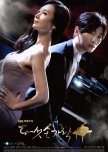
A must-have for makjang-lovers. A roller coaster of evil where you end up feeling for the worst, too
"Five Fingers" is a must-have for all those who love "makjang". A roller coaster of evil... and it doesn't stop. The spectators are allowed to tear their hair, wriggle, turn, annoy themselves to the bitter end... It's about the piano, too - some battles take place while playing, being around and doing business with the grand piano.This is about family and South Korean family values/virtues in particular. Submission to the value system is declined as a virtue in all its fatality. In the interweaving of events, the viewer inevitably faces the question again and again: is it virtue or stupidity, virtue or impertinence, virtue or arrogance?
The series dates from 2012 and makes a cunning attempt to challenge viewers to confront the value system. The rebellious thoughts inevitably arise in the minds of the viewers, because the well-meaning decisions that the protagonists make over and over again drive the values surrounding family (love) to the absurd and trigger suffering one after the other.
The ambivalence inherent in this is exploited perfectly. The actors do their part.
With 30 episodes there may be a tendency to flee in between, but I don't know anyone who didn't stick it out to the end. The ending may not be the classic happy ending, but it may be the true happy ending: the wheel of fortune comes to a standstill. Peace.
At first glance, the greed for money and power seems to be the driving force behind all evil. But actually it is the greed for love and recognition. The wheel of fate and suffering has already been turned on long before the protagonists - the two half-brothers In-ha and Jin-ho - compete against each other. To a certain extent they live out the unresolved conflicts of their parents. If you want to ask who is to blame for everything, then the root goes back a long way. The father pulls the strings out of the grave and it goes even further. A nice psychological study. Especially since you can't help but feel sympathy for everyone, even the worst troublemakers.
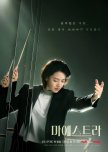
The aura of this series is characterized by the inspiring world of the orchestra and its musicians
Be prepared: "Maestra - Strings of Truth" is impressively led by a highly concentrated Lee Young-ae and set in a refreshingly rare environment for a KDrama. Focusing on one of the very few, but highly talented, globally famous female conductors, the aura of this series is characterized by the inspiring world of the orchestra and its musicians. We also meet management lounges and the luthier´s workshop. Enchantingly, this maestra and her particular orchestral world offer a quite unique and mature flavour of series experience."Maestra - Strings of Truth" lives from the psychological depths and relationship dynamics of the main characters as well as the pathos of the world of classical music. Of course there are also intrigues, love, yearning for revenge and more, but the focus is on the maestra as a person in her struggle with herself, her passion for music and her life challenges.
For the FL, her love for music is at the center of her being and aspirations. As far as the men in her life are concerned, they would rather like things to be different. However, the maestra has a good reason why she has consistently dedicated her time to the orchestral world. And when it comes to her work, she is uncompromising. Above anything else, she is delivering a perfect performance. This is non-negotiable. Some people would prefer that to be different too...
For her role as maestra, Lee Young-ae completed several months of violin and conducting lessons. Her 'first violin', Hwang Bo-reum-byeol, also took eight months of lessons specifically for this purpose. Considering, there's a lot of passion involved in this KDrama, even before filming even started... and you can feel it.
By the way, the idea for the story did not grow on South Korean soil. It is a K-style remake of a French television series that focused on the career struggles of the very few women in this profession. (Only five percent of all conductors worldwide are female...) "Maestra - Strings of Truth" is dramaturgically heated up by a fatal love triangle with collateral damage and an even more fatal family legacy that the maestra would rather do without.
Intensive. Atmospheric. Thrilling, too.

Mature romance, yet balanced with the eternal youth residing in the feeling of falling in love.
"Second to Last Love" is processing the topic 'getting old in South Korea' in a playful, sometimes profound, sometimes tender way. 'Old' means having exceeded 40. An 'Ahjumma' can be a swear word for a South Korean woman. Also ´Ahjussi´ for a man. In German it would probably be comparable if the casual 'Du' among around +/- 30 year old people suddenly became a 'Sie' - then you know: now I've fallen out of the '+/- same age'...In South Korea, a large percentage of life revolves around looking good and looking young. Marriage is also a big topic - wedding photos are always placed accordingly large and dominant in the house or apartment. The family ultimately forms the meaning of life, so to speak, if you follow in the footsteps of tradition. In case you stick to this standard - look good, marry well and take care of an honorable family - then everything is fine. Just one step to the right or left of the path creates social turbulence. Women (and men too) must be prepared and able to stand this. The issue will come up more or less confrontationally on every occasion.
This South Korean peculiarity is the starting point for many a KDrama. In "Second to Last Love" as well. However, this story chooses its own fine style and an almost progressive approach to it. Age and age differences in partnership are brought up again and again in several respects. Likewise, married vs. unmarried. Not only the conservative, but also somewhat more free-spirited perspectives and opinions are interspersed in a refreshingly good mood.
While the female protagonist is a career woman and single, the male protagonist lives as the head of a patchwork family. His wife died long ago, as did her fiancé. (Not that they didn't want a partner...) They've both been living their particular single life-style for decades by now and have gotten used to it. They no longer expect anything to change. This is where the KDrama comes in and tweaks a few dramaturgical adjustments in order to shake them both up and question their lives, their life plans, their longings and decisions. They may be 'old' in the eyes of society, but their lives are far from over. And THAT is the key point! There is still time and space for new decisions, for change, even for a second love in the last half of their life. Apart from aging, "Second to Last Love" is also about taking responsibility for one's own life and one's own decisions, including new ones. Despite all the depth, which it doesn't shy away from, the KDrama also has a touch of humor overall.
The protagonists´ 'grown-up' relationship is so delightfully mature and refreshingly grounded. Kim Hee-ae and Ji Jin-hee embody this adult maturity successfully balanced with the magic of eternal youth that resides in the feeling of falling in love. Their rapprochement, their feelings for each other and their attitude towards the other form a pleasant contrast to the more enthusiastic youthful forms that the protagonists are also confronted with...
The story is embedded in a picturesque, idyllic landscape and also allows a look behind the curtains of KDrama industry. The plot and its difficult issues - 'aging' and 'taking responsibility' - are rounded off by a few secondary plots within the patchwork family and work colleagues. A bit of intrigue should not be missing either. Last but not least, and above all, there is the romance, which despite the obstacle-filled terrain unerringly and sensitively paves the way between the two protagonists...
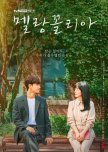
Richly layered. Excellently staged.
"Melancholia" is silently impressive. If you're just looking for a sweet romance, you'll be disappointed. Still, the story is a tribute to love. It's also about school, education, South Korean madness about education and the market around it, the arrogance of the top 10 percent of society, as well as bullying and intrigues for optimal certificates. Altogether it´s ambitious in several respects."Melancholia" is about the love for mathematics. Mathematics is for the protagonists what notes are for music lovers or colors for artists: a way to capture and express the beauty behind the beauty of life and the aesthetics of life on this planet. In "Melancholia" there are two people (and actually two more) who recognize this beauty with their mathematical 'sense organ', feel it deeply, understand it, and want to delve even deeper - thus see and meet each other and understand how they feel inside.
"Melancholia" refers to "Melancholia I" - one of the three master engravings by Albrecht Dürer - mentor and student look at it together in the context of the story and communicate about it, understand it, and doing so get closer. The Dürer artwork is an allegorical composition peppered with geometric elements and symbols. There are a wide variety of interpretations in the professional world. The two protagonists in the KDrama are inspired by this and enthusiastically help interpret. In connection with "Melancholia I" by Dürer, his sentence "But I don't know what beauty is" has also been handed down. This creative crisis, through which every creative person (whether mathematician, artist, etc.) has to go through at some point, is processed in the KDrama in its own way - in the first half the male protagonist and in the second half the female protagonist is struck by this question. Individually both are thrown off track and have temporarily lost sight of their joyful creative power. They inevitably stand in the face of melancholy - to some extent a dark, black tunnel, that opens up the passage to a new, luminous dimension of their creative power.
With regard to the student, the first half of "Melancholia" focuses on a variation of Weltschmerz, which is at the same time an expression of suffering from the beauty of the world. The protagonist can't help but see this perfection of aesthetics in everything everywhere. And yet he is alone in this. He cannot convey his perception, cannot share his experience with his fellow human beings. That's way too high for the others. Family, friends and even some teachers cannot relate or really understand what he is about. Some of his classmates may misunderstand him as a show-off and envy his genius. In fact, he suffers from the loneliness in which he is stuck. Not the beauty of the world. Yet all this changes after he meets a mentor who in the face of his 'brilliance' isn't (like many others) out for her own gain. Rather, she recognizes his rare ability of perception and gives it a grounded direction. She did not promote the genius, but the human being, who should not exploit his talent, yet learn to enjoy it. The mere experience that he is not alone with his way leads him out of his suffering. This is how he finds his place in the world and no longer has to withdraw and hide from it.
However, "Melancholia" also shows the mentor as she herself is stuck in an aloof, depressive phase. The motive is the same: also lonely, isolated, trapped in her feelings that she cannot share with a world that cannot understand her. And this time it is her student who can remind and encourage her to step outside and back into the world.
"Melancholia" is a hymn to higher mathematics, with which the beauty of life finds an abstract form(el) - but also to art, which tries to aesthetically translate the formulas and mathematical knowledge into new colors and new forms.
"Melancholia" is a homage to the love between two kindred spirits who recognize each other in their kinship and can't help but love each other (selflessly and unconditionally).
But "Melancholia" is also one of many stories in the shade of a brutal South Korean education industry that unscrupulously rides on the hopes, fears and worries of parents and students and repeatedly bears the bitter fruits of bullying, abuse, meanness, despair and fraud produces. In this context, a variation of it is once again told in an exciting, at the same time moving and excellently staged manner.
Finally , this story of the two main protagonists is both a new edition and a contemporary free reinterpretation of the relationship between of two historical mathematicians: the Tamil Srinivasa Ramanujan and the British Godfrey Harold Hardy. The KDrama refers to the extraordinary, intuitive mathematical skills of the historically real Tamil math genius, who was professionally recognized and promoted by the British Hardy. In 1913 Ramanujan came to England under the wing of his mentor and subsequently became known for several important discoveries. It is said that when asked what his own greatest contribution to mathematics was, Hardy said without hesitation that it was (his mentoring for) Ramanujan. He described their relationship as his only romantic experience in life. And with that he refers first and foremost to the very special form of eroticism of their shared, highly concentrated, soaring flights of intellect. Anyone who has never had this experience of a shared 'Eureka' will probably struggle with the romance aspect of this KDrama. Everyone else might experience it differently... .
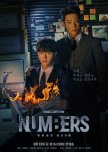
Don't be deterred by a supposedly dry accountants´ world. It´s feisty. Suspenseful. Emotional, too
"Numbers" is about auditors, balance sheets and accountants. It's obviously all about numbers. That may put some people off. It's also about what lies behind those numbers, and that may at times seem even more complicated to the uninitiated. However, deliberately illustrative examples are repeatedly interspersed. And it is even more gratifying that it is not necessary to understand all this in every detail in order to enjoy the series. “Numbers” is about a rational and clever mastermind. Yet it is also about having the heart at the right spot. It´s feisty. It´s also emotional. It stands up and means it. Great!"Numbers" is definitely worth it getting involved in the abstract world of accounting specialists. Especially since their decisions, in turn, have consequences for a world that juggles numbers even more aloof - Investment Fonds... While the auditors keep an eye on the current state of the balance sheet and put its potential through its paces, investors only care about future returns and often want the maximum profit regardless of the losses - which others have to bear for it.
Numbers are numbers. But the decisive factor is who has the sovereignty of interpretation. Numbers sound clean and objective, apparently. Yet, they stand for people, their visions and their decisions. Hidden underneath are solutions, too. As always, the question you´re asking, will make the difference – leading the way for your attention and focus. And as always, different possible perspectives exist. Also in the world of numbers.
"Numbers" is about a revenge campaign – again. There are actually several. It is about those who, with good reason, do not want to be intimidated by the power of the powerful – again. They have nothing (more) to lose. The bad guys are really bad. They have long lost their heart or never had one to begin with. This makes for plenty of interesting relationship dynamics.
"Numbers" also offers an interesting variety of intelligence and competence. Bottom line for revenge candidates – again: just on your own it is almost impossible to make a difference. However, someone courageously has to make a first clever and striking move ahead. With heart and soul. Then maybe others will remember that their heart was once in their right place, too. (In a rational, hierarchical world that takes for granted that there is no room for irrational emotions or personal interests, it's easy to forget just that.)
"Numbers" is a bold story about rather impure moves in the world of accounting and investment. A complex story. At the same time, an exciting, thrilling story that is fun, too. No matter how remote this world of dizzyingly high numbers may be for most of the audience, watching the story feels good overall. You get a high-flying, intelligent mixture. The actors show a strong presence in their roles and thus contribute a lot. The pace is right. OST fits fine.
My suggestion: don't be put off by suits, ties and a supposedly dry, conservative, number-dominated accountant business world. Sure enough, "Numbers" has it all!
------------------------------------------------------------------------
Side Note:
Banks in South Korea have been taboo for investors since the Asian crisis. For the bank sector, on the other hand, financial investment transactions are not permitted. Just now, in 2023, fundamental reforms were launched - some are even talking about a revolution. The banking sector is just now being opened up to new players in order to stimulate competition.
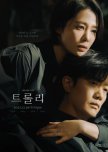
Its empathic. Powerful. Yet, beware: it is rather slow & actually not on the bright side of life
"Trolley" is a SBS production for South Korean TV first of all, even it is promptly running on Netflix, too. One could say that the KDrama is about a politician's wife, who is caught up in an emotionally draining past and overtaken by an extremely unpleasant present. One could say that it is about an ambitious politician with a promising career, who is in the middle of the national assembly election campaign and will give everything for it. One could say that it is about the classic moral trolley dilemma, which is running through the story like a key note – should one intervene in the unstoppable, catastrophic events and sacrifice one human life in the process, or let things take their course, the but then (in the case of the trolley dilemma) will claim several victims? With respect to each of these varying aspects, the story delivers suspense, depth and emotional intensity, enriched with complex details until the end.
"Trolley" is like a large patchwork quilt made up of many colorful, isolated, fateful pieces of the jigsaw puzzle that becomes a whole while increasing in suspense episode by episode. And this spectacular whole is what I particularly appreciate about this KDrama. Because the production is dedicated to a sensitive issue in South Korea society: the devaluation, harassment, oppression, contempt, discrediting, defamation, exploitation, sexualization of women and widespread physical violence against them.
The KDrama articulates a quiet howl calling for change. This howl, which has been rather mute for the longest time, wants a voice. This howl of pain wants to be heard. One voice should become many. Laws protecting women (and victims of abuse in general) would be all well and good. But even more so (and above all) there is a need for courageous role-models of women (and men) who lead the way. (Or for a start: KDramas and their e.g. female protagonists...) Role models are needed, who stand up for themselves, for their lives, for what happened to them, and for their rights as human beings. Tangible role models are needed embodying what lies at the heart of (these much-needed) laws: the non-debatable dignity inherent in every human being, regardless of gender, creed, birth, or ability. Paragraphs alone are not enough. They must be filled with life. With people who dare to actually venture out of the familiar swamp with their heads held high. And that's (for women) still easier said than done in South Korea 2023. "Trolley" embodies these circumstances in an impressive way. In fact, this is more than overdue. This TV production also places this message with some force and spreads it worldwide, too, so it cannot be overheard. Can it? May the message get through and encourage … women, young people, … and men too.
However, the spotlight is not directed at one or 'the' man as such, but at society as a whole, in which women structurally function (or supposed to function) well; in which they themselves participate in the premises - as mothers, as classmates, as part of a bullying, via public and Social media easy to manipulate crowd. The poisonous social thorn is so deeply rooted within women themselves: a systematically and consistently cultivated, inferior attitude towards their life. The the circumstances usually aren´t even seriously questioned because: that's the way it is… has been… (will be?)
Practically all of the women in this KDrama represent a self-esteem that has been deeply hurt and thus weakened as a result of private and public devaluation or even physical violence. They all somehow learned to live with it. They are battered, wounded and scarred, and they suffer from their feeling of inferiority that weakens them into old age. The worst thing about it: that they are still standing there alone, because nobody really can/wants to acknowledge their suffering and justified anger. Women have had to learn to live with the fact that there are no witnesses, no advocate, no encouragement, no attention, no consolation for them and their traumatic experience of harassment. No one is standing in their corner. The social message: You didn't deserve anything else. You´re to blame. 'Submissive, quiet, tame and silenced, everyone can do whatever they want.' Such is fate as a daughter. As an unwanted daughter. As the first daughter. As a daughter-in-law. As a wife. As a divorced woman. As an illegitimate mother. That something, which has remained deeply in these women, now shows impact, too: so that they either secretly and quietly devalue and question themselves, alternatively devalue others on their behalf, or let others devalue them on principle. This painful experience has not been redeemed to this day and should not be redeemed (from the social point of view of some). It is the ingrained yet invisible mark that South Korean society brands its women with. With "Trolley" it is out in the open. In multiple ways. Options for change are discussed, and the difficulties involved are also explored.
A strong portrait of society, cleverly prepared and seriously presented, yet in an entertaining manner. The KDrama meets a red-hot zeitgeist that calls for winds of change. The story courageously challenges the conservative, patriarchal attitude, which by nature denies women the right to be fully acknowledged human beings with the same rights. In the course of the last year, blood boiled high in South Korea after President Yoon declared 'structural sexism' being no longer existent in the Republic and wanted to abolish the Ministry for Equality and Family (or move it to other departments). In these times (see also the side note below), "Trolley" is a courageous and important production, because it tells a different story - that of devalued, sexualized, abused women in a self-satisfied man's world. Respect!
Its empathic. Powerful. Yet, beware: it is rather slow and actually not on the bright side of life.
---------------------------------------------------------------
SIDE NOTE: --- Always burning topical: violence against women in South Korea ---
If you compare the crime statistics in (i.e.) Germany and South Korea, South Korea is clearly the safer country. Seoul is arguably one of the safest cities in the world. But not for women...
Overall, violence in South Korea may be limited. But against women it is alarmingly widespread. Of the violent crimes recorded in South Korea, about 80 percent of the victims are women. In 2020, more than 58 incidents of sexual violence, including rape, were recorded among 100,000 residents in South Korea. (There were 12 in Germany for comparison). There have been newspaper reports of brutal femicides almost weekly in recent years. In a national survey conducted by the Ministry for Gender Equality and Family in the summer of 2021 (the ministry still existed then), 57.8 percent (!) of women stated that they felt threatened by misogynistic violence.
But the current political line is different. President Yoon stands for the values of the so-called "New Men's Solidarity". Behind this is a deeply patriarchal, conservative thinking that denies women to be full human beings with the same rights. Accordingly, the official line tends to go backwards: the penalties for false allegations of sexual assault are increased and the politicians rather argue with classic perpetrator-victim reversal: the women provoked the men by not doing what the men want them to do . Courts rarely judge in the interests of women. On the contrary. The outcome might be: victims of sexual violence are punished more severely than the perpetrators. Law against defamation of sex offenses is far stricter than that on sex offenses. It allows victims of sexual violence to be sentenced to up to 3 years in prison – even if it is proven that their publicly disclosed allegations are true. In the actual cases of sexual offenses, the verdicts against the perpetrators, however, are mostly merciful, with a mild sentence for crimes against women, as soon as there is one or the other weakening reason or an impeccable good reputation. Lax investigations and re-traumatizing behavior towards female victims in police and judicial authorities make matters worse.
All in all, it is very difficult for women to effectively defend themselves against the violence they might have experienced. Headwind blows from almost everywhere. Here we are again with the deeply patriarchal, conservative basic attitude of a society that denies women as a matter of course that they are full human beings with the same rights. This 'self-evidence' needs to be questioned and confronted. Resistance works best when women unite and at least start to stop this structural mutual devaluation among themselves. Speak, talk, share, cry, console... You don't need laws for that. Supporting one another, acknowledging injustice as such, comfort and compassion would be soothing ointments on the wounds of countless women that could heal a little bit better that way.
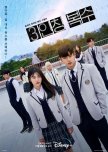
A sad & highly topical social issue, dealt with in a palpable, exciting, sensitive, touching way
"Revenge of Others" is set in the world of South Korean high school students. No teenage squabble, but a story with substance and depth. With flexibly intertwined subplots, it offers a sad and highly topical social issue, dealing with it in a palpable, exciting, sensitive and touching way. Should you watch? Yes!"Revenge of Others" (like "Weak Hero Class 1" in 2022) deals with the topic of mobbing /bullying. In Korean, the slang term 'wang-ta' is quite common, and for me helped for a better understanding of the special and increasingly dramatic situation surrounding bullying at South Korean schools, which can even lead to suicide. (See side note below.)
This KDrama spotlights a Seoul high school where there appears to have happened a suicide. Everyone is shocked. Some know more. But if the sister of the victim, who has been living separated from her brother for many years, would not try to get to the bottom of it, then this would be a sad case of suicide without a murmur. It probably happens all too often in one way or another that fundamental questions in an apparently obvious case are left unanswered. However, this KDrama bravely wants to get to the bottom of the matter and its circumstances - here in the person of Ok Chang-mi.
As so often in the context of bullying, the adults don't look too good and don´t offer anything promising for making a difference regarding those fatal peer group dynamics. They are left outside. The high school students have to find a way for themselves to get along with their classmates - if possible highly adjusted underneath the social wang-ta radar (or at least with a solid network).
"Revenge of Others" is a production for the international streaming market. Things rarely get too brutal at Disney, though. The amount of violence is therefore limited (compared to e.g. "Weak Hero Class 1") and instead there is more room for relationship dynamics in side plots, causal connections and shades of gray.
By the way, in connection with "Revenge of Others" there is also a whole series of promising actors to admire!
---------------------------------
SIDE NOTE: --- Wang-ta in South Korea ----
With Wang-ta, the focus is not so much on the 'act' - bullying or harassment - but rather on the entire context of active and violent marginalizatin of an outsider. For example, it can be used as a swear word for the excluded person or as a description of the bullying activity. In a collectivist society like South Korea, group affiliation and group interest is paramount. This applies not only to the family, but also to the school class and also to the peer groups within the class or school. Unfortunately, this value system results in a fatal situation when it comes to actual bullying: bringing shame on the group, the outsiders are at the bottom of the social hierarchy. Whether it's because of school performance, family background, origin, belonging to an undesirable minority, looks, dress, a handicap, an unusual belief or an abnormal inclination: Wang-ta is a label that no one wants to personally be confronted with. Everyone agrees on that. At the same time, Wang-ta becomes a free pass for more or less cruel mobbing/bullying. Worryingly, perpetrators, victims, and witnesses alike accept the premise: all forms of bullying, almost anything related to Wang-ta, is permissible. The perpetrators take advantage of this, the victims immediately feel even more inferior in terms of their shortcomings (of whatever kind), and the bystanders silently nod the action as justified - or even actively join in. There is no moral barrier against this specifically cultural, collectivist background. It can even get out of hand. There are cases where the entire school has ended up participating in one person's wang-ta. From a Western, individualistic point of view, this is perhaps difficult to understand, because apart from group norms there are other socially recognized ethical principles that could be introduced as a serious confrontation of wang-ta behavior. Unfortunately, this hardly is the case at South Korean schools with a collectivistic social culture.
--------------------------------------
SIDE NOTE: In connection with this KDRama also an additional side note on
--- Punishment vs. Suffering of Victims ---
The psychological trauma for the bullying victims are with long-lasting effect. Unfortunately, the punishment of perpetrators is not proportionate to this day. Punishment is rather harmless - it may be annoying to the perpetrators, but not really a deterrent. Far too much must have happened before expulsion actually occurs. A corresponding entry in the files is actually completely deleted two years after graduation. In fact, nothing is left behind on the perpetrators' side. On the other hand, from the memory of the victims the experience cannot be so easily erased ...
The documented cases of wang-ta in South Korean schools (yet many are not officially reported) have steadily increased over the past three decades. According to a study by the Ministry of Education, between 2013 and 2017 the cases have more than doubled from 11.749 to 31.130. There are also increasing numbers of victims who saw suicide as their only way out. It has now been empirically documented that South Korean pupils with a personal Wang-ta experience are more suicidal than those without. Suicide is by far the most common cause of death among 10 to 24 year olds. Almost 1.000 young people took their own lives in 2020 alone.
In respect of the lack of serious consequences for the perpetrators in Wang-ta cases and their comparatively unsatisfactory punishment, a kind of vigilante justice has been established among the families of the victims concerned. "Revenge of Others" picks up on this (similar to "Angry Mom" a few years earlier) as a theme in variation.
In fact, facing a lack of serious alternative punitive measures it seems not uncommon for relatives of victims to pay someone of the same school age to take care of an appropriate 'punishment' - i.e. 'undercover'. Clearing up violence with violence is of course a dubious solution. Sadly, this seems to be the only way to show real consequences to the perpetrators and give the victims at least minimum size satisfaction. ...Although it should be probably considered more of a satisfaction for the relatives of the victims, because the victims themselves still have to deal with their psychological wounds and scars for a long time. Revenge does not undo the painful experience of mentally and physically harassing exclusion...
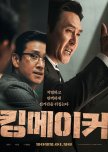
Political thriller, eloquently dealing with SK´s struggle for true democracy. Inspired. Profound.
Election campaign is a fight. But what rules should be applied? Do you inevitably have to hand in your ideals and ethics at the entrance as price for political success?Critical processing of South Korea's recent past - the democracy movement - is still in its infancy, because the dictatorship just finished a few decades ago and its proven structures within conservative circles are still resonating today. Increasingly, however, this topic is also taking up its media space. The political thriller "Kingmaker" sets a bold milestone by taking on a dazzling, comparatively upright, almost exemplary political personality, who for a long time seemed to have no chance in his sincere, ambitious fight for real democracy: Kim Dae-jung. He was the first opposition candidate to be elected President of the Republic. He is also the only South Korean to ever receive a Nobel Prize for his work on democracy and human rights. Some call him the Nelson Mandela of Asia...
In particular "Kingmaker" tells (in the plot prepared with some poetic freedom) about the early years of his political struggle and the arduous path that ultimately led him to the Blue House. The focus is less on his biography and more on what he still stands for in the eyes of most South Koreans today: real democracy. Or rather, against what he wanted to compete: the conservative, elitist, political cronies who stand in the way of progress and justice, if it is not in their own interest.
In the service of the electoral success, Kim (like so many politicians on this planet) was probably tried more than once to sanctify the 'good' purpose in the sights of many a morally questionable means. This difficult balancing act between an upright political attitude and one's own venality in a pact with a promising "devil" is illuminated and processed here in an impressive way. The temptation of a promising shortcut to success usually comes with a price that has to be paid sooner or later. (The internal struggle of 'for' versus 'against' shapes the decision-makers in South Korea with their well-established, conservative, shadowy networks to this day. This is actually writing daily history. And the TV and movie productions are full of it, too.)
The status quo - submission to the apparently influential 'more powerful' - is contrasted with a historically real personality. In order to convey the emotional dilemma in a dramaturgically clear way, Kim's campaign strategist of the first hours, Eom Chang-rok, was stylized as the main character and staged fictionally. In fact, little is known about him other than that he is said to have been brilliant and downright genius.
The story is about Eom Chang-rok's intelligent crisis interventions, solution approaches and election campaign strategies, some of which are in stark contrast to Kim's idealistic democratic values, that are always geared towards serving the people. The audience is confronted more than once with the question of whether the end might justify the means. Isn't the power of the people just a well-meant illusion after all? Wouldn't it be more efficient for the state leadership if a few (more or less) smart people decided for the many others in a short decision-making process? "Kingmaker" touches the foundations of political morality and ideology.
However, the KMovie also touches on very human weaknesses: the need for approval and the temptation to be seduced. These weaknesses are truly human and have to be dealt with by everybody - somehow, someday.
"Kingmaker" is a moving political thriller set in recent South Korean contemporary history about the stumbling blocks and challenges of true democracy. A democracy, that requires responsible, mature and accountable citizens. A democracy, that will always be challenged by the forces and networks operating in the shadows, whose goal is to incapacitate the citizens and instead rule for their own personal benefits.
An unpleasant subject, indeed. Yet the KMovie is eloquently dealing with this crucial issue for any democratic society.
A brilliant approach to this topic as well as to a younger chapter of South Korea´s history.
Inspired storytelling.
A profound production.
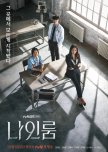
I consider the acting performance in "Room No. 9" as it´s true highlight
Another KDrama about revenge? Not quite. Ok, it´s about injustice done in the past. Yet, it´s rather about the desire for official recognition of innocence, let alone the unjust verdict - as reconciliation with fate. Revenge is secondary. I would say, that is good news. The protagonist is more concerned with her own peace of mind than primarily with new suffering that she in turn has to inflict on her perpetrator. She doesn't want to keep turning the wheel of fate, she wants to stop it.Yet once again, being stuck in the past is a driving force: in this case, the protagonist sits in prison awaiting execution - for decades. ----- SIDE NOTE: South Korea has in practice stopped using the death penalty, but all legislative initiatives to officially abolish the death penalty (most recently in 2019) have so far failed.
Dramaturgic maneuver with magical components: a body swap. The motif is not new to KDrama. Although the personalities in the body are now different, the bodies themselves still have their cellular memories plus the environment inevitably remembers the person originally owning this body. So there is lots of room for funny situations - although they are always solved humorously, they are not slipping into farce. The story is serious and touching, but also playfully told. Laughter is allowed. A teardrop here and there, too.
I consider the acting performance in "Room No. 9" as it´s true highlight: Kim Hee-sun and Kim Hae-sook manage brilliantly to unite the characteristic aura of the other and thus perfectly embody the switch. They are marvelous to watch. And it's a pleasure to see the experience in the body of the other person has a transforming effect becoming a new (cellular) memory...
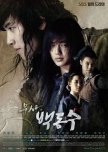
Epic and action are by a humorous ribbon tied together in a touching, gripping way. Go for it!
Set in a jaunty kaleidoscope of relationships, friendships, brothers in arms, blood ties, loyalty, heroism and heartbreak, the time of King Yeongjo, Crown Prince Sado and King Jeongjo is epicly (for a 2011 series production) portrayed."Warrior Baek Dong Soo" is full of fun, martial arts and of course: drama. There is politics, too, yes, butteh KDrama is definitely more on the drama and action side. I benevolently ignored some daring storytelling details and the selectively very optimistic choreographic freedom in the heroic staging. "Warrior Baek Dong Soo" balances between history and entertainment, between epic scope and personal tragedy, between deep, dramatic emotionality and airy, playful, humorous, good mood. The KDrama finds a rousing swell, in which the emotional waves are allowed to splash from all directions - with a story that sails between historically memorable facts, legendary heroes, steep (but by no means absurd) hypotheses, and colorful dramaturgical freedom. It offers great entertainment thanks to an exceptionally strong presence of all actors - whether young or old.
Baek Dong-soo himself is wonderfully portrayed by Yoo Jin-goo (young) and Ji Chang-wook (adult) in the sense of a largely impulsive jester who wears his heart on his sleeve. On the other hand, there is the introverted, somehow tragic, always serious and withdrawn Yeo Woon (Yoo Seung-ho as an adult and Park Gun-woo as a boy). The demanding life of the young warriors is sweetened by the unique charms of Hwang Jin-joo (cheeky, tomboyish: Yoon So-yi) and Yoo Ji-sun (stoic, reserved: Shin Hyun-bin). The by now veteran acting legend Choi Min-su as assassin lord in gothic style gives his very personal flavor throughout the 29-episodes long ride through time. And quite a few more there are.
In this KDrama it is rather the dramatic love story and love triangle of the older generation that pushes itself emotionally to the fore than that of the younger generation. This is probably due to the fact that Baek Dong-soo's generation is more dominated by humor and a cheeky mouth that wants to take on fate, while the older generation is dominated by the decades-long heavy burden of overwhelming life experience.
The historical hook of "Warrior Baek Dong Soo" is (as the title suggests) Baek Dong-soo, who went down in history as a heroic swordsman legend. He was one of three authors of the 'Muye Dobo Tongji' (= Illustrated Manual of Martial Arts), which is now officially classified World Heritage. This four-volume work summarizes the common weapon techniques of the Joseon period. (The book gained its extraordinary importance as a rare, valuable historical source on military affairs and Joseon martial arts, since older works fell victim to the destructive Qing invasions from the north.) However, swordsman Back Dong-soo first of all became legendary because he repeatedly saved King Jeongjo from being assassinated. And this juxtaposition of swordsmen serving the king versus assassins serving a however motivated client, originally inspired the 2010 KDrama comic entitled Honorable Back-Dong-soo.
The KDrama "Warrior Baek Dong Soo" thus also contrasts swordsmen and assassins - in terms of their ethics, their loyalty, their code, their mission, their training, their emotional world. This ambivalent and tragic dynamic makes the 29 episodes going and the time spent watching it worthwhile. They are so similar and yet they are worlds apart. One has to protect, the other has to kill. And yet, he who kills also protects. And yet, he who protects also kills. Both are henchmen. Both give everything. Risk everything. They're simply on different sides. Depending on the situation, the act of the swordsman is considered correct and honorable, while that of the assassin is considered a crime and vile. In my opinion, the KDrama reveals one of its strongest moments in the emotional explosiveness of the fatal bond between the first swordsman and the leading assassin lord (each of their own generation). They are so close emotionally and yet they live in different worlds: One in the light open, the other in secret. In tried and tested KDrama manner, the 'bad guys' (assassins) once again - despite the concentrated ambivalence of their characters - play their way taciturnly, but effectively into the hearts of the audience.
The framework for the plot is in beautiful continuity provided by sword fights and political intrigues. The flesh is made of fatal, ambivalent, intense relationship ties and feuds between the protagonists. History sets the direction. Epic and action are by a humorous ribbon tied together in a touching, gripping way. Go for it!
---------------------------------------------------------
Historical SIDE NOTE: --- Yangban of Joseon in the 18th century between conservative thinking and reformist, modern impulses. ---
The historical background of KDrama is shaped by three memorable decendants of the Joseon Dynasty. King Yeongjo, who holds the record-breaking 52-year reign on the throne, Crown Prince Sado, who went down in history as a tragic, possibly greatly misunderstood figure, and his son, who contributed to peace and prosperity as King Jeongjo. In addition to the serious efforts of the two kings for stability and progress, there are the divided camps among the nobles who fight by all means for their supremacy in political and social affairs.
Between 1674 and 1689 the Namin (Easterners) steered the administration of the country in their interests, followed by the Seoin (Westerners), who then entangled their position of power in disputes: the Noron representing the old, strict, conservative neo-Confucian doctrine and the Soron fighting for a new, modern, reformist, practice-oriented doctrine (Sirhak). It was probably King Yeongju's merit that despite the massive differences, the balance of power between the camps was well balanced for a long time. However, the price he had to pay for reasonably stable living conditions in the empire was his son, Crown Prince Sado, who favoured modern teaching and thus provoked the Noron. At least that is how one historical theory interprets the dramatic events surrounding Sado, who is said to have died locked in a box. The KDrama follows this theory (and not the annals, that present Sado as falling into insanity that could no longer be curbed, or a third theory that suspects a massive father-son conflict as the cause).
So, in line with the theory, which sees Sado as a progressive, reformist spirit, who wants to liberate his country from the supremacy of the Qing, "Warrior Baek Dong Soo" tells the story of the loyal followers of the ruling family, who are skilled in martial arts, and how King Jeongjo wants to live up to his father's modern visions. In doing so, with an open attitude the young king, too, always chose a balance and thus continued the proven political strategy of his grandfather, who in doing was able to stay alive more than half a century. In this way, King Jeongjo succeeded in the 24 years of his reign between 1776 and 1800 in building the Hwaseong Fortress as the center of his reign, in advancing education and science, in optimizing national defense and in creating the Royal National Library of Gyujanggak. However, he could never be sure of his life... at least seven assassination attempts alone during his first year in power are historically recorded. ... A striking reflection of the massive resistance against the attempted modernization of thinking in Yangban circles.
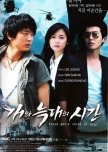
A spy drama right from the start
"Time between Dog and Wolf" is a KDrama from 2007. But don't worry, the series still knows how to grip today. (I don´t even dare to imagine what a terrific spectacle the KDrama would be, if it would come along in the style of 2020 KDrama cinematography...)The story starts - as so often back then - with the childhood days, e.g. the small and big traumata from that time. The entanglements are laid out and there's a lot in it Makjang-wise. However, it is not your typical makjang, The story is exciting, has a good pace and the shadowed complexity makes it difficult to see through. "Time between Dog and Wolf" is a spy drama right from the start and leaves hardly anything out.
The title sums it up quite well. Actually, this refers to the Latin metaphor "Inter Canem et Lupum" - between dog and wolf. In the evening twilight it is difficult to distinguish, so to speak, whether a wolf or a dog is standing in front of you, although you can just about make out that it will be one or the other. It's not pitch black yet.
However, this expression does not only refer to the twilight, but also contains another metaphorical allusion: This is the time when the wolf goes hunting and the dog seeks its bed... Who stands before me, though? Can I trust?
Thus the 16 episodes consistently maintain their twilight... Wolves (mainly) and dogs (a few) cross paths. Sniff each other. Fight each other. Join together to form a pack. Are hunted and hunt. Give themselves away. Make up for it. The one. The other. And others again. On top of all that, love puts plenty of salt into the wounds.
Ultimately, the symbol is even suitable for this KDrama in a third respect. In addition to the topics 'distrust/deceit', 'hunter/hunted', there is also the fact that both dogs and wolves are extremely social pack animals...
This is a KDrama that has a lot to offer in terms of exciting and moving entertainment. Lee Joon-gi shows edge here even at his younger age. But all of them express their emotions with some intensity. This does not go bye unnoticed.
The fact that a considerable part of the action takes place in Thailand also brings unexpected exoticism into the scene, which doesn't hurt.
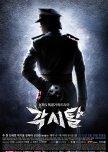
Epos, drama & national frustration with impact – about the birthing era of Korean nationalism
"Bridal Mask" is a South Korean variety of Zorro - in this case hiding behind a historical Hahoetal ceremonial mask used in Korean tradition for satirical theater and shamanistic rites. The avenger of Japanese oppression hides behind the classic mask 'Gaksital', which symbolizes an innocent bride.This brings us to the central theme around which the dramaturgical web was spun: Korea's time under Japanese protectorate (1905-1910) and the annexation as a Japanese colony that followed a few years later (1910-1945). In this context, this KDrama has a lot to do with national self-image of the Korean people, which is still formative today. (If you are interested: See Side Note below.)
Accordingly, "Bridal Mask" was very successful as a KDrama and was extended by 4 episodes due to its success.
"Bridal Mask" is about the desperate attempt of the oppressed population to counteract the notorious oppression of the Japanese tormentors. As the story progresses, the rather inexcusably conformist anti-hero becomes the avenger of the downtrodden, whereas the once benevolent, noble, antirassist teacher becomes the unscrupulous avenging angel. The daughter of a Korean resistance fighter provides explosive fuel, turning best friends into bitter opponents and rivals for the heart of their beloved. Everything becomes dramatic in the highest degree - the romance, the bromance, as well as the resistance struggle against brutal oppressors, with or without bridal mask.
'Gaksital' squeaks into the most diverse excesses of Japanese tyranny, above all: torture as a common method of interrogation. The hero also thwarts the insidious with false promises recruited young women as sex slaves or comfort women for the Japanese soldiers. Finally, by his activities his compatriots are also encouraged to engage in civil disobedience.
The tyrannical, ruthless attacks of the colonial masters are historically documented. Active resistance from the population as well. However, the actual plot of the KDrama is completely fictitious: A Zorro-like swordsman behind a traditional bridal mask is not known. Also, at the time of the Japanese invasion, Joseon was already severely weakened politically. In this case, the assassination of the head of state is poetic liberty. (At the time of the emperor´s actual death in 1919, the country had already been a colony for 4 years.) Finally, the secret organization of the ´Kishokai´ and their vision for a greater Japanese empire are fictitious. This Kishokai did not exist. However, there is a kernel of truth in it, because ultra-nationalist secret societies, especially those associated with Japanese military, apparently existed actually.
Overall, the K-Drama brings a black chapter of painful Korean history with epic impact and highly dramatic emotional entanglements back to life. Eventually, the memory is perhaps still so painful, because it wasn't all that long ago. To date, there has been no reparation, remorse, or at least acknowledgment from the Japanese side for the suffering inflicted.
Japanese colonial rule is inseparably interwoven with the very special Korean national pride, because this period marks the birth of Korean nationalism in the first place. And the KDrama builds on that. "Bridal Mask" in that sense is first and foremost a highly Korean production for a Korean audience. (Nevertheless it is obviously gripping for an audience with other national backgrounds, too.)
By the way, it may also be no coincidence that the series aired on TV in 2012, when the Korean government first formally asked Japanese Emperor Akihito for an apology...
----------------- SIDENOTE: --- Romantic Korean nationalism ---
Whether Goryeo or Joseon, since the tribes of the peninsula were united under one ruling dynasty, the people lived largely introverted and rather isolated from the rest of the world until the late 19th century. Here and there the borders have always had to be defended against invaders or retaken, but the people on the peninsula had nevertheless remained adamant and had not actually actively mixed with others. Today, there is often talk of 'pure ethnic blood', which provides the breeding ground for a more romantically (vs. civic) tinged national identity: A Korean usually feels descended directly from the original ancestors. Consequently, a Korean will typically identify first with his/her ethnic roots and only then, at some point, as a citizen of the Republic of Korea.
This very special national identity was directly born out of the developments associated with the opening of the country and an increasing international presence at the end of the 19th century. On the one hand there was hope for flourishing trade and technical innovation, on the other hand suddenly the USA, along with China, Japan and Russia, also wanted a piece of the pie and - more or less aggressively and consistently - took advantage of the opportunity and sometimes also inexperienced naivety of Joseon. As a result, resistance formed and the nationalist struggle for independence was born. It was necessary to use all conceivable means to preserve the nation´s autonomy and to protect the heart of Korean culture from invasions and encroachments by foreign nations. Particularly, resistance was directed against Japan's ruthless interventions in robbing the Korean people of their language, their own names, their religion and their dignity. Japan's declared goal was to discriminate against the Korean people and to assimilate them by any means (... and Japan wasn´t even squeamish with its own civilian population, being known for its brutality...).
At that time, Japan had deployed an omnipresent, almost overwhelming military and police presence that can hardly be compared with European imperialism as we (i.e. Europeans, as I am) know it. Hardly a day went by when the invaders did not have direct, mostly deliberately humiliating contact with the civilian population. So 4 traumatic decades can become a very long time...
This national frustration, pain and anger is still formative in the collective emotional memory. With "Bridal Mask",this receives a contemporary emotional safety valve in KDrama guise.
-----------------------------------------------------


 9
9 38
38 15
15
















